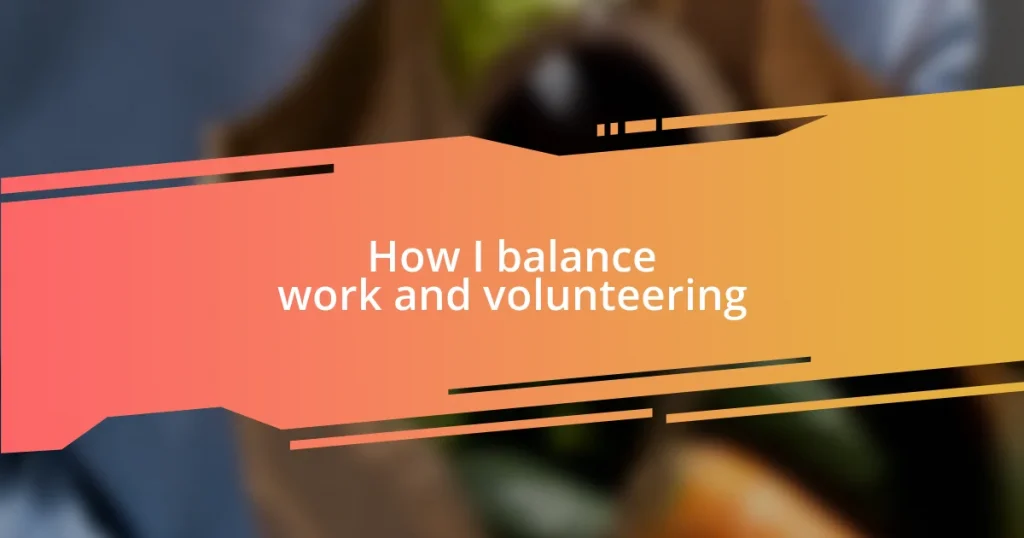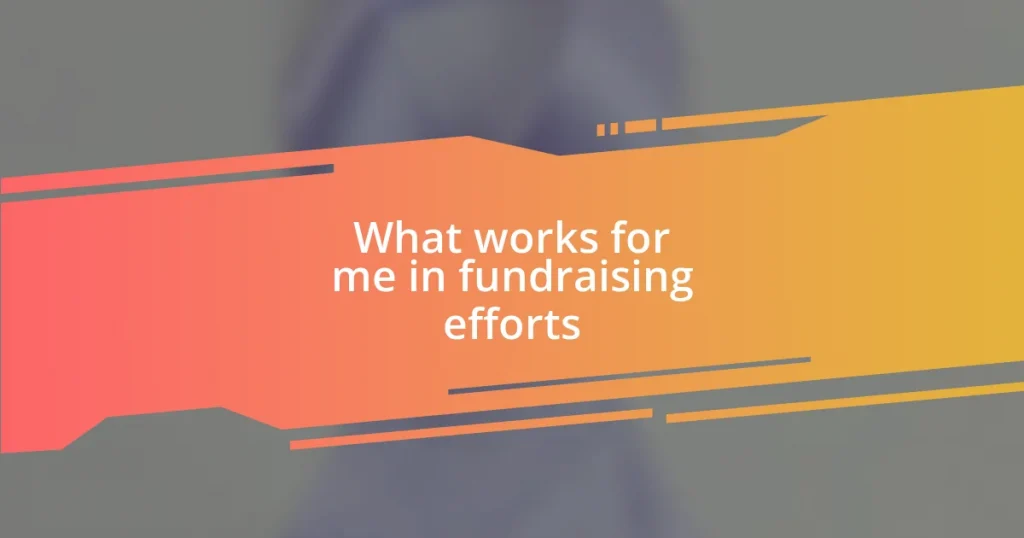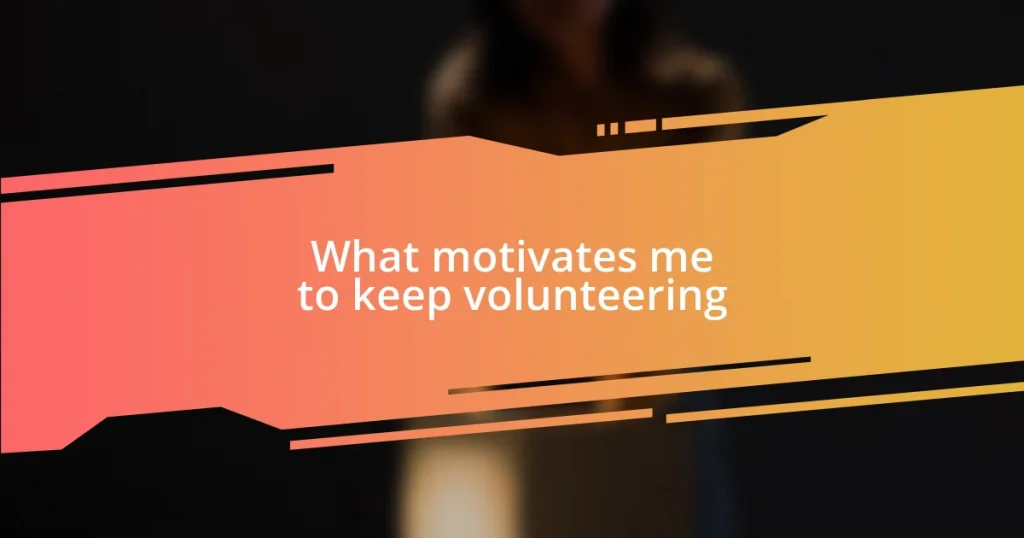Key takeaways:
- Utilizing time management techniques, like the Pomodoro Technique and prioritization, enhances productivity and helps manage commitments effectively.
- Identifying and reflecting on personal priorities leads to better work-volunteering balance, allowing for manageable commitments that align with energy levels.
- Regularly evaluating commitments and setting realistic goals fosters self-care, flexibility, and engagement in both work and volunteering, preventing burnout and promoting fulfillment.
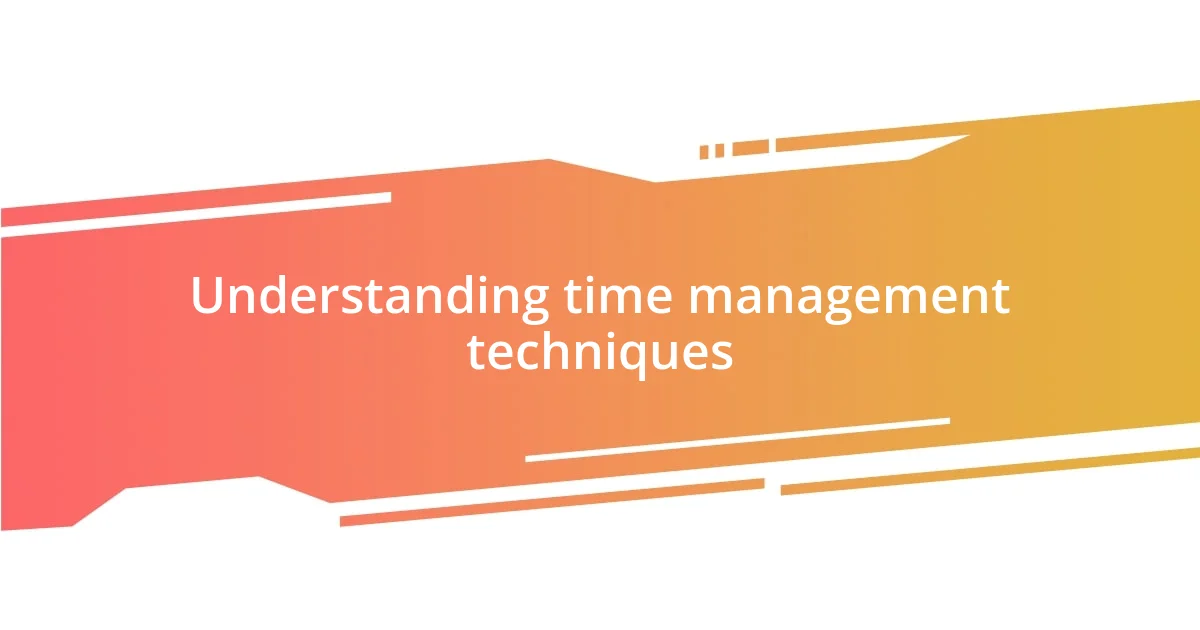
Understanding time management techniques
When I first began juggling a demanding job with volunteer work, I felt overwhelmed by the challenge of managing my time. I soon discovered the power of the Pomodoro Technique, where I would work for 25 minutes and take a 5-minute break. This simple approach not only helped me stay focused but actually made me more productive.
Another technique I found invaluable is prioritization. I remember one hectic week when I had to decide between completing an urgent project for work and preparing for a weekend charity event. By writing down my tasks and evaluating their importance, I realized that spending just a few extra hours on the project could free up my weekend for the charity. It made me wonder—how often do we miss opportunities by not fully assessing our priorities?
I’ve also learned to set clear boundaries—both with myself and others. As much as I love supporting causes I care about, there are times when I have to say no to certain volunteering opportunities to keep my schedule manageable. Have you ever felt guilty for turning down a request for help? It can be tough, but I assure you, creating that space allows me to truly commit to the causes that matter most, leading to a more fulfilling experience overall.
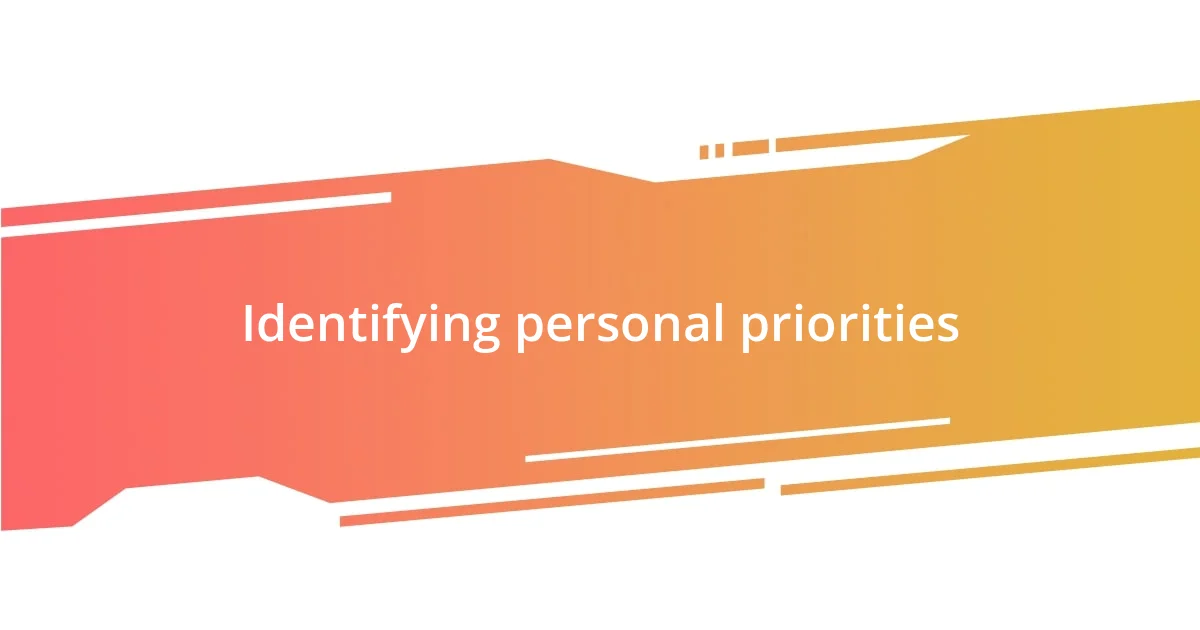
Identifying personal priorities
Identifying my personal priorities was a turning point for me in balancing work and volunteering. I remember sitting down with a cup of coffee one Sunday, reflecting on what truly matters to me. That clarity helped me realize that my family, my career, and my volunteer commitments didn’t just compete—they could actually complement each other if I prioritized them appropriately. I found it essential to rank my obligations, as doing so transformed the overwhelming chaos into a more manageable flow of activities.
I’ve also identified that my energy levels play a significant role in how I prioritize my commitments. Some days, I’m buzzing with energy after a good night’s sleep, while other days I drag myself out of bed. Understanding this has allowed me to align my most demanding tasks with when I feel most capable. For example, if I have an important work deadline looming, I’ll reserve my peak energy hours for that, saving my evenings for lighter volunteer tasks where I can still make a difference without overexerting myself.
Reflecting on personal priorities also means revisiting them periodically. I recall a particularly busy month when work deadlines clashed with a volunteering opportunity I’d committed to months earlier. Ultimately, I had to decide to step back and let someone else take over. It was hard to let go, but that moment taught me the importance of flexibility in how I prioritize my time. Have you ever faced a similar dilemma? Balancing priorities is a continuous process, and being honest with ourselves can lead to the most fulfilling choices.
| Personal Priorities | Reflections and Actions |
|---|---|
| Family | Always a top priority; I find joy in scheduling family dinners to reconnect. |
| Work | I prioritize tasks weekly, ensuring that urgent deadlines come first, which helps manage stress. |
| Volunteering | I choose causes that resonate deeply with me; sometimes, saying no allows for greater commitment. |
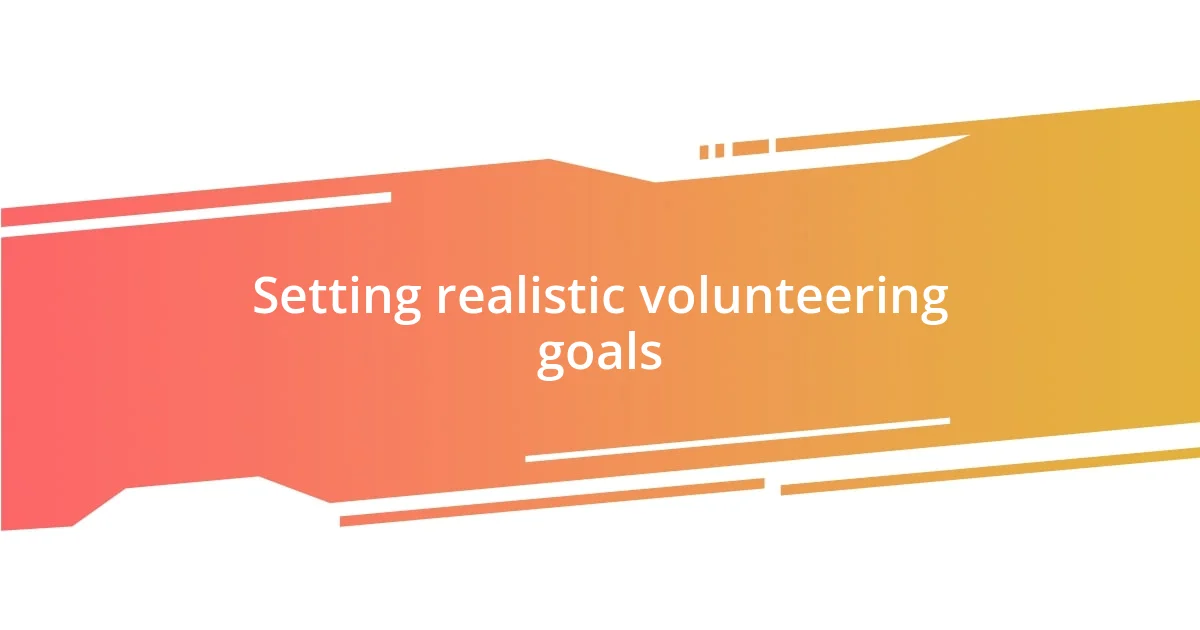
Setting realistic volunteering goals
Setting realistic volunteering goals is crucial for maintaining a healthy balance between work and service. I recall a time when I excitedly signed up for multiple volunteering events, only to find myself burnt out and resenting my commitments. It was a painful lesson; I realized that setting achievable goals wasn’t just about what I wanted to do, but what I could genuinely manage.
To make sure my volunteering efforts are effective and satisfying, I like to consider the following:
- Assess my available time: I take a close look at my calendar and realistically evaluate how many hours I can dedicate each month.
- Choose causes with significance: I focus on organizations that resonate with me, ensuring my time spent is both enjoyable and impactful.
- Break larger goals into smaller tasks: Instead of aiming to completely overhaul a project, I set modest monthly milestones that allow for steady progress.
- Communicate my limits: I find it vital to communicate openly with volunteer coordinators about my availability, ensuring they don’t overwhelm me with expectations.
By setting these realistic goals, I’ve been able to not only fulfill my volunteer commitments but also find joy in my contributions.
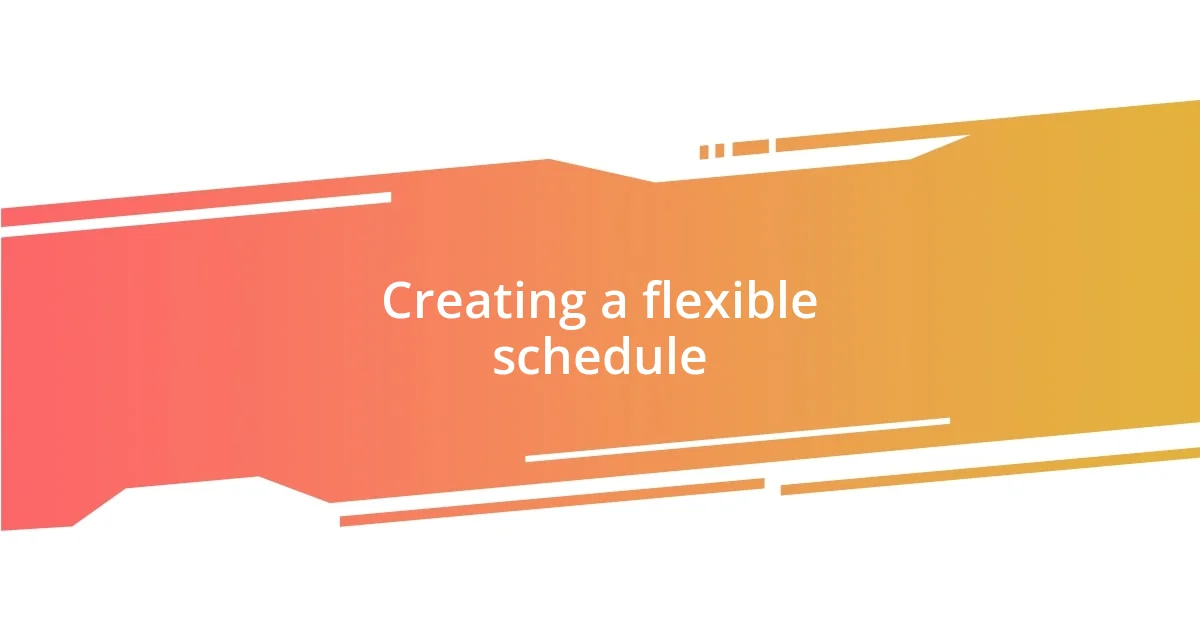
Creating a flexible schedule
Creating a flexible schedule is a game changer for blending work and volunteering. I remember those days when I felt like I was juggling too many things at once, and it just drained me. By incorporating a flexible schedule, I’ve learned to adapt my activities around both my work commitments and my volunteering goals, which has been a tremendous relief. I often ask myself, “How can I make this work better for me?” It’s a simple yet powerful question that drives me to find solutions.
One technique I use is the time block method, where I dedicate specific blocks of time for work tasks and volunteering. For instance, I’ll carve out blocks each morning for focused work, leaving afternoons free for volunteer activities. This structure allows me to enjoy both parts of my life without feeling like I’m sacrificing one for the other. Have you ever thought about breaking your day into chunks? It not only keeps me organized but also lets me flow between responsibilities without feeling rushed or overwhelmed.
I also embrace the idea that flexibility doesn’t mean chaos. Just last week, I had to shift my volunteering plans due to an unexpected work commitment. Instead of resisting, I adjusted my schedule and found an alternate volunteering opportunity that fit in seamlessly. Sometimes, we forget that being flexible is a skill we can practice, and it’s entirely okay to reassess and reshape our plans. How liberating is that?
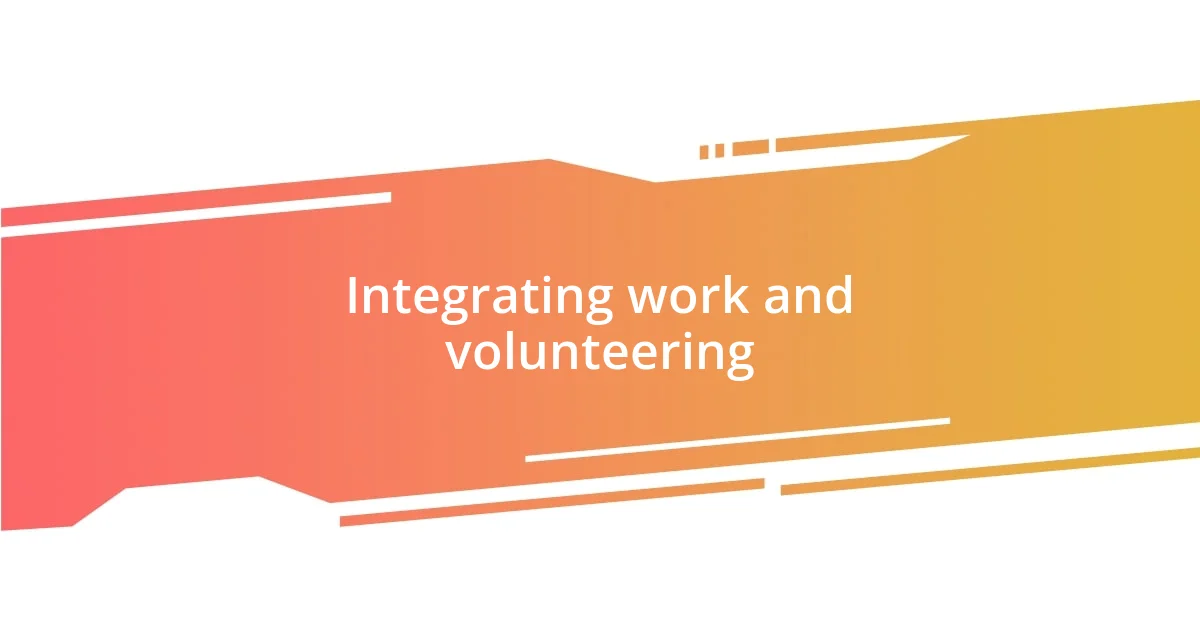
Integrating work and volunteering
Finding ways to integrate work and volunteering has been an enlightening journey for me. I once experienced a clash of priorities when a major project at work coincided with a volunteering opportunity I was passionate about. The stress it created pushed me to get creative in blending these worlds. I’ve discovered that volunteering during lunch breaks or using time after work allows me to seamlessly engage in community service while still excelling in my professional role. Isn’t it amazing how a little creativity can turn a hectic schedule into something manageable?
A practical approach I adopted includes aligning my volunteer work with my professional skills. For instance, I recently volunteered to assist a nonprofit with their marketing efforts. Not only did it allow me to contribute my expertise, but it also enriched my work experience and provided fresh insights for my job. I’ve found that integrating my skills not only benefits the organizations but enriches my own career in ways I hadn’t anticipated. Have you ever considered how your job skills could amplify your volunteer impact?
At times, I’ve had to remind myself that it’s all about maintaining that delicate balance. Last month, I was stressed about juggling an important work deadline and a commitment to volunteer at a local shelter. Instead of letting anxiety take the lead, I reached out to a colleague. We collaborated, and I was able to adjust timelines without neglecting my volunteer commitment. This experience solidified my belief that integrating work and volunteering isn’t just possible—it can be mutually beneficial and deeply rewarding. Don’t you think that’s a powerful reason to find that balance?
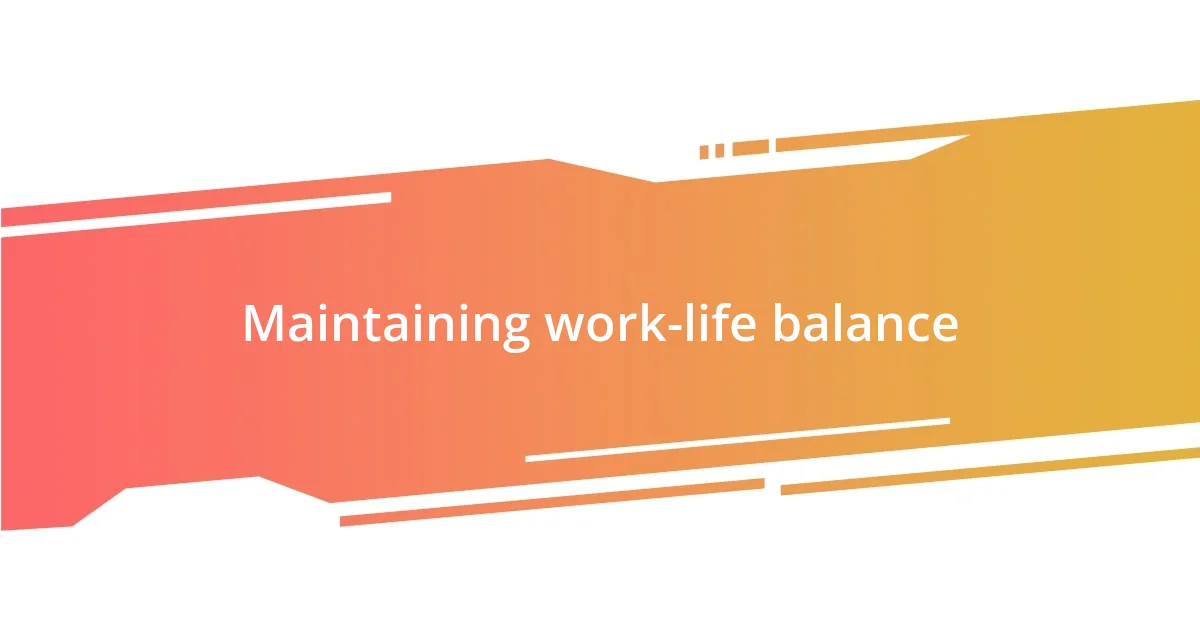
Maintaining work-life balance
Maintaining work-life balance often feels like walking a tightrope. I vividly recall a time when my work life surged with a crucial project, while my volunteering role at the community garden beckoned me. The pressure was real, and I couldn’t shake the guilt of not giving my all to either side. I learned that setting boundaries is essential; for me, designating “work only” hours on my calendar keeps distractions at bay. Have you ever drawn those lines for yourself? It can create a powerful sense of control.
I’ve also found that prioritizing self-care is a key part of achieving this balance. A few months ago, I hit a wall, mentally and physically drained from my commitments. I took a step back, recognizing that I needed to recharge. A weekend retreat focused on mindfulness and relaxation worked wonders. It reminded me to check in with my own needs amidst the busyness of life. How often do we overlook our well-being in pursuit of balance? It’s crucial that we don’t forget to nurture ourselves, as it ultimately enhances our capacity to give to both work and volunteering.
Lastly, I’ve discovered the magic of community support. Recently, I faced a scheduling conflict between a crucial work meeting and a volunteer orientation I was really looking forward to. Instead of the usual panic, I reached out to fellow volunteers who filled in for me while I navigated work demands. Their willingness to step up not only alleviated my stress but deepened my connection to the group. Isn’t it comforting to know that you can count on others to share the load? This sense of camaraderie is invaluable for maintaining a healthy work-life balance.
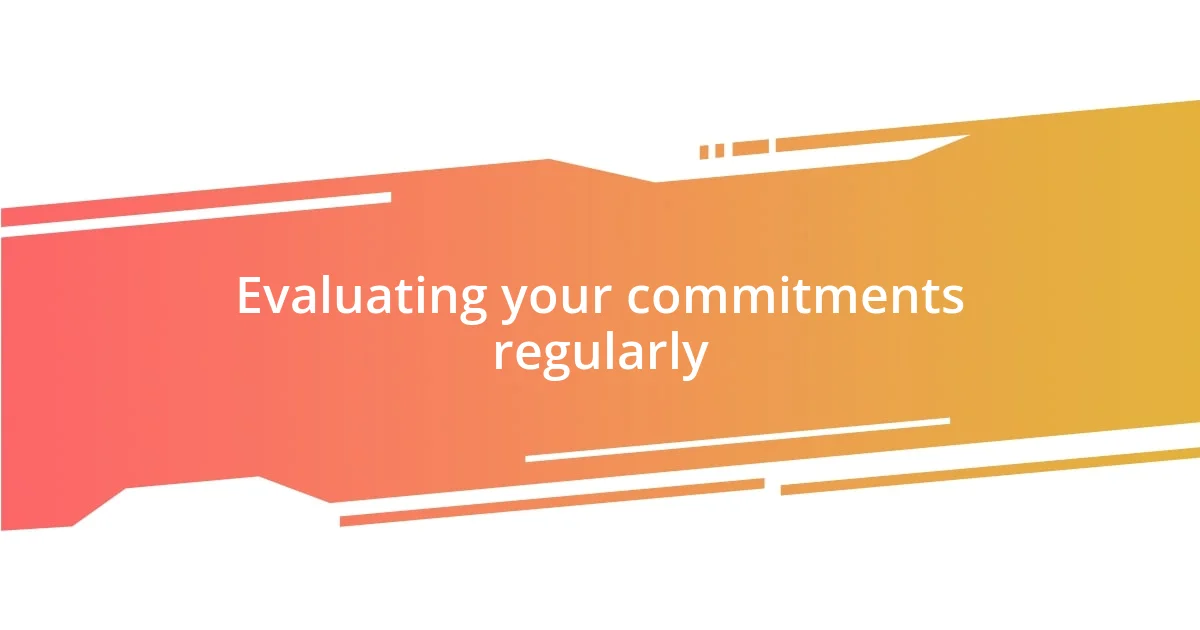
Evaluating your commitments regularly
Evaluating your commitments regularly is something I’ve come to see as both necessary and transformative. There was a period when I took on too many volunteer roles without considering how it impacted my working life. This led to late nights and an overwhelming sense of anxiety. By periodically assessing my commitments, I learned to let go of what no longer served me, prioritizing those contributions that truly resonated with my values and energy levels. How often do we truly reflect on the commitments we make?
I remember an instance when I signed up for multiple events at my local animal shelter, driven by excitement. However, after a month, I found myself drained and unable to engage fully in any of them. The energy I hoped to contribute was waning. It was then that I paused and reevaluated my schedule. Simplifying my commitments to just one breeding initiative allowed me to not only sustain my enthusiasm but also deliver a more substantial impact. Isn’t it amazing what a little reflection can do for your spirit?
It’s also vital to involve others in this evaluation process. When I share my commitments with a close friend, they often offer fresh perspectives. One time, after discussing my overflowing plate, my friend pointed out that taking on everything wasn’t a badge of honor—it was a quick path to burnout. This moment of clarity sparked the courage in me to articulate my limits more openly. How many times have we hesitated to admit when we’ve taken on too much? Trusting someone to hold you accountable can be a game-changer in achieving a healthier balance.










